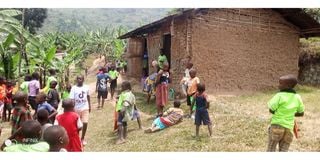Bundibugyo leaders seek special funding to save poor schools

The Bundibugyo District leadership is calling for affirmative action, with special funding from the central government to address critical gaps in education and infrastructure.
The district in a hard-to-reach area on the border with the Democratic Republic of Congo (DRC) has struggled to provide essential services for years, particularly in its mountainous regions. Of the district’s 27 lower administrative units, 13 are situated in these mountainous areas around Mt Rwenzori, making it difficult for schools to receive much-needed infrastructure support.
Many schools have operated in dilapidated conditions since being taken over by the government, according to district leaders.
Senior Education Officer Justus Bithaghalire explained that about 10 primary schools have seen no significant infrastructure investment despite being under government management for years.
"All 10 schools, located in mountainous areas from the Uganda-DR Congo border to the border with Ntoroko district, continue to operate in crumbling classrooms," Mr Bithaghalire said.
Schools such as Bugoga, Bulemba, Kasaka, Irago, Kibaghara, Budgenge, Bundiwelum, and Kistolima are among those that have seen no recent improvements. Two secondary schools, Bukonzo SS and Kisoko SS, are also in dire need of new classroom construction.
Mr Bithaghalire emphasised that an annual allocation of Shs2 billion over five years is necessary to build about seven classrooms per school each year and provide a safe learning environment for students. He highlighted the additional challenge of high construction costsin the mountainous regions, where transporting materials significantly inflates project expenses.
"Transporting a bag of cement to the site costs Shs100,000, and a single jerrycan of water costs Shs2,000. By the time construction is completed, the costs are exorbitant," he explained.
The district currently receives only Shs400 million for construction across all its primary schools, which Bithaghalire describes as insufficient.
He added: "Some Ugandan children are studying in conditions akin to monkeys, in classrooms that are unfit for learning."
He called for a special budget of at least Shs1 billion annually to address the severe infrastructure needs. At Kitsolima Primary School in Harugale sub-county, the situation is dire.
The school, which has existed for over 20 years, has only mud and wattle structures. The headteacher, Mr Justus Bahimba, said classrooms were destroyed by mudslides last year, and though parents rebuilt them using local materials, the structures remain unsafe.
"We urgently need permanent classrooms to protect these children," Mr Bahimba said.
Bundiwerume Primary School in Kirumya Sub-county faced a similar fate when a 2017 landslide destroyed all its permanent structures.With NGO assistance, three classrooms were reconstructed, but the school now only serves pupils from Primary One to Primary Three,down from the original Primary Six.
The headteacher, Ms Annah Mutabazi,said enrollment has dropped from 152 to 98 due to the challenges the school faces, including its remote location, lack of water access, and absence of staff housing.
"Parents are considering transferring their children, but we try to motivate them by providing essential scholastic materials," Ms Mutabazi explained.
Kasaka Primary School, located near the DR Congo border, has operated for 18 years in mud and wattle structures. The headteacher, Mr Patrick Balyananzighu, said despite adding a Primary Seven class this year, the school remains in poor condition.
"We have 14 registered candidates for Primary Seven, but the pupils are crammed into classrooms that could collapse at any moment," hewarned.
The Bundibugyo District Chairman, Mr Robert Tibakunirwa, highlighted the challenges of providing services to these hard-to-reach sub-counties, where some school inspectors avoid visiting due to the difficult terrain.
"Inspectors see these assignments as punishment and prefer to gather data in more accessible areas," he said.
Mr Tibakunirwa criticised the district's insufficient budget allocation, particularly for roads damaged by landslides.
"We appeal to development partners and the central government to reconsider their policies. Allocating a standard figure such as Shs1 billion for all districts is inadequate, especially for disaster-prone areas like ours," he said. Parents such as Moureen Muhindo feel abandoned by the government. "Our children are forced to study in classrooms that are falling apart.We are worried for their safety and their future," she said, expressing the community's frustrations.
Mr Moses Kadobera, the associate programmes director at World Vision Uganda, said the NGO has invested approximately Shs30 billion over the past 20 years in Bundibugyo, focusing on vulnerable areas suchb as Kasitu, Ngamba, Ntotoro, and other hard-to-reach sub-counties.
Their intervention has addressed education, health, water, and child protection, among other needs.
Mr Tibakunirwa acknowledged World Vision's contributions, stating that several schools in remote areas had received much-needed facelifts, but others still require government attention.



0 Comments